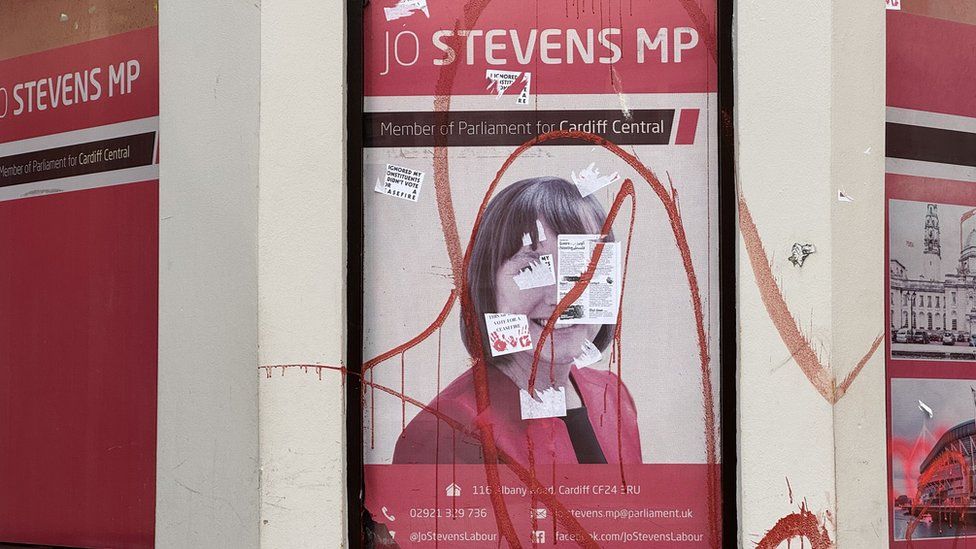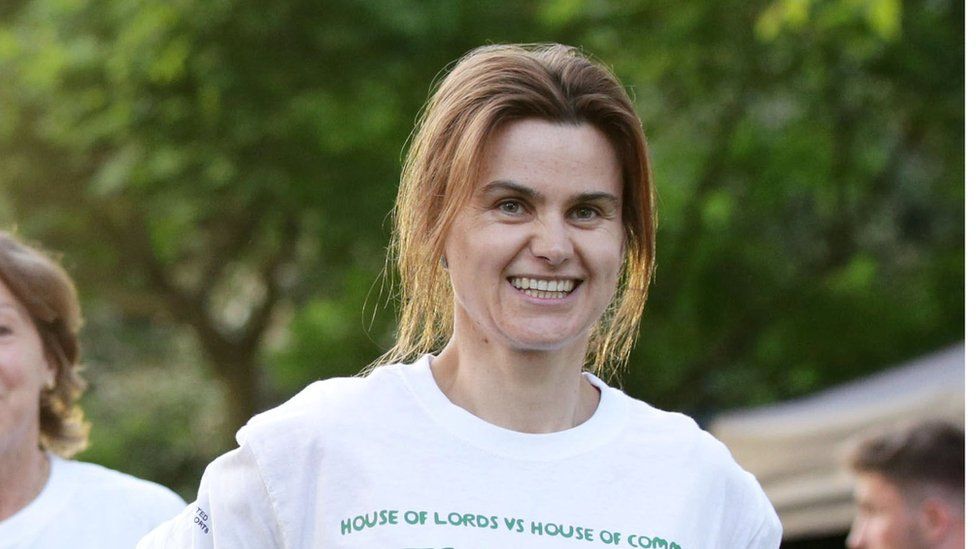
MPs facing threats to their safety will get extra security, as part of a £31m package to help protect the UK's democratic processes from disruption, the government has announced.
Measures could include the provision of bodyguards for MPs most at risk.
The funding will also be used for additional police patrols in response to increased community tensions.
Home Secretary James Cleverly said no MP should have to accept threats or harassment as "part of the job"
There has been growing concern in recent months over MPs' safety since the outbreak of the war in Gaza.
Last week, Commons Speaker Sir Lindsay Hoyle cited threats to politicians in his controversial handling of a debate on calls for a ceasefire in the conflict.
Prime Minister Rishi Sunak has also raised concerns about MPs being "verbally threatened and physically, violently targeted" in recent weeks, with "legitimate protests hijacked by extremists".
The Home Office said the funding package would be used to increase private sector security provisions for those facing greater risk and to expand cyber security advice to locally elected representatives.
It said the money would also ensure all elected representatives and candidates have a dedicated named police contact to liaise with on security matters.
Meanwhile, a new communities fund will be established to allow extra police patrols in England and Wales, with forces able to use the fund to increase police presence in response to specific events.
On Wednesday Home Secretary James Cleverly will hold talks with police chiefs to discuss how to better ensure the safety of MPs.
"The government will take every possible step to safeguard the people, processes and institutions upon which our democracy relies," he said.
"I take the safety and security of all members of the House with the utmost seriousness. None of us should have to accept that enduring hate crimes, harassment, or threats is part of the job."
Security Minister Tom Tugendhat said: "Over the past few weeks we've seen disgraceful attempts to intimidate MPs and undermine our democratic processes. That behaviour is a threat to our democracy, and toxic for our society."
Earlier this month, Conservative MP Tobias Ellwood's home was targeted by pro-Palestinian protesters, with the police warning his family to stay away as it could have "antagonised the situation".
Another Tory MP, Mike Freer has said he is standing down at the next election, after death threats and an alleged arson attack on his constituency office had "become too much".
Preet Gill, Labour MP For Birmingham Edgbaston, said death threats had become "a norm" in her job, while Conservative Stafford MP Theo Clarke said she carried a panic button directly linked to the police "at all times".
Last November, the office of shadow Welsh secretary Jo Stevens was daubed in red paint and plastered in posters accusing her of having "blood" on her hands after she abstained in a vote on a ceasefire.
The debate over the safety of MPs was heightened after the murder of Labour's Jo Cox in 2016 and Conservative Sir David Amess in 2021.
The murders prompted a review of security measures, with changes including included improved security at MPs' homes and offices and additional private sector-delivered security where necessary.

House of Commons Speaker Sir Lindsay Hoyle said the money provided "much-needed reassurance".
"It will enable us to build on the improvements we have made over the past two years, working with the police and Home Office to enhance security at MPs' homes and offices, and crucially when they are out and about meeting their constituents."
On BBC Breakfast, former Cabinet minister Sir Robert Buckland also said he welcomed the funding, arguing that if MPs were left concerned about their safety "voices will be muffled".
"If we start sequestering politicians away from the public, I'm worried that that Westminster bubble, the ivory tower syndrome, will only get worse and divorce politicians from the people they represent... that's why safety is a very important consideration."
Former deputy Labour leader Harriet Harman had suggested particularly vulnerable politicians could be allowed to participate in the House of Commons from home.
Speaking to LBC she said "they could sometimes vote through the division lobbies, or they could sometimes vote online. I think we've got a process now that we experimented with during Covid, which we could actually bring that back in."
However, the prime minister's deputy spokesperson said Rishi Sunak did not want to see "anything that restricts debate" adding: "MPs should be on the floor of the House having robust debate, expressing their views. That is fundamental to our democracy."
And Labour shadow minister James Murray told Talk TV "face to face interaction makes me a better MP and I think anything that forces us to limit that and make us less accessible and less open I think is bad for democracy".
Related Topics
https://news.google.com/rss/articles/CBMiL2h0dHBzOi8vd3d3LmJiYy5jby51ay9uZXdzL3VrLXBvbGl0aWNzLTY4NDE5OTg30gEzaHR0cHM6Ly93d3cuYmJjLmNvLnVrL25ld3MvdWstcG9saXRpY3MtNjg0MTk5ODcuYW1w?oc=5
2024-02-28 08:48:09Z
CBMiL2h0dHBzOi8vd3d3LmJiYy5jby51ay9uZXdzL3VrLXBvbGl0aWNzLTY4NDE5OTg30gEzaHR0cHM6Ly93d3cuYmJjLmNvLnVrL25ld3MvdWstcG9saXRpY3MtNjg0MTk5ODcuYW1w
Tidak ada komentar:
Posting Komentar